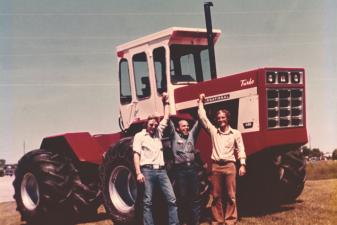The Haymarket Affair

Before McCormick Harvesting Machine Company was merged with International Harvester Company in 1902, the McCormick family name was already infamous among the men and women of the labor movement in 1880s Chicago. The anarchist Chicago publication The Alarm described Cyrus McCormick Jr. as "the very picture of human depravity and viciousness, only common to people who have exhausted their vitality and manhood by unbounded licentiousness," while the Arbeiter-Zeitung, another Chicago publication, just called him a "pimp."
In the late 1880s, organized labor was beginning to attempt to assert itself, and big industry reacted with oppression and tough stands. Cyrus McCormick stated, "The right to hire any man, white or black, union or non-union, Protestant or Catholic, is something I will not surrender." McCormick had no intention of letting the union into his operation, and introduced new machinery that eliminated skilled workers. In February 1886, he locked the union out of McCormick Reaper Works and replaced them with non-union workers. The conflict grew increasingly heated, and McCormick hired 300 armed Pinkertons --private detectives-- to protect the non-union employees from angry union demonstrators.
It was Cyrus McCormick Jr.’s refusal to close his factories to non-union labor that led to one of labor history’s darkest days. Library of Congress ICHi-31338
Library of Congress ICHi-31338
On May 3, 1886, well-known Chicago-area dissident August Spies spoke at a gathering of the striking Lumber Shovers Union members.The gathering took place near McCorkmick Reaper Works, whose union workers had been locked out since February. As Spies spoke, the crowd began heckling the non-union replacements leaving the plant. A melee erupted, and the police came to break it up. The dissidents threw stones and the cops started firing into the crowd. At least two demonstraters were killed, and the stage was set for the infamous Haymarket Square Riot, which took place the following night.  Library of Congress ICHi-03659
Library of Congress ICHi-03659
The next night, the infamous Haymarket Square Riots broke out when 175 police marched on a peaceful demonstration at about 10:30 p.m., ordering the demonstrators to disperse. One of the demonstrators threw a homemade bomb amongst the policemen, killing one member of the force and injuring several others. Gunfire was exchanged between several hundred demonstrators and the assembled policeman. About sixty officers were wounded, seven policemen died, and at least four demonstrators were killed.
The resultant trial is one of the most notorious miscarriages of law in American history. The journalists and labor leaders who spoke at the meeting were sentenced to death for inciting riot. One committed suicide shortly after the trial, while four others were hung on November 11, 1887, including Albert Parsons, who had been the editor of The Alarm when it spoke out against McCormick. The incident lives on as an example of labor’s struggle with powerful industry leaders.
The event proved to be an omen for the McCormick family’s struggles with labor, as well. Fowler and Brooks would both battle with organized labor and suffer costly strikes that played a significant role in the eventual downfall of the International Harvester Company.







